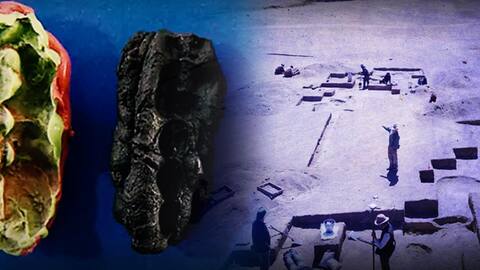Hunter-gatherers gathered more than they hunted, says study
What's the story
New archaeological discoveries in South America's Peruvian Andes have shown that early human hunter-gatherers primarily ate a plant-based diet, debunking the popular belief that they relied on a high-protein, meat-heavy diet. Researchers found that wild potatoes and other root vegetables made up the main source of nutrition for these individuals. Dr. Randy Haas, an archaeologist at the University of Wyoming and senior author of the study, said their analysis revealed diets consisted of 80% plant matter and 20% meat.
Study process
Study focused on remains from two burial sites
The researchers studied bones from two Andean burial sites and compared the chemical forms of nitrogen and carbon with those found in local plants and animals. Their findings showed that plant-based foods made up the majority of their diets, with meat playing a smaller role. In addition to analyzing bones, researchers found burnt plant remains at the sites and noticed distinct dental-wear patterns on several individuals' upper incisors, suggesting that tubers like wild potatoes, were their main food source.
Plant-diet hypothesis
Wild tubers and large mammals predominant: Penn State Study
Jennifer Chen, a PhD student in anthropology at Penn State University and first author of the paper that was published in journal PLOS One, stated that ancient hunter-gatherers in the Andes who lived between 9,000 and 6,500 years ago, mostly consumed wild tubers. The study also indicated that large mammals such as llamas or deer made up most of the meat in their diet, rather than smaller animals like birds or fish.
Early assumptions
Archaeological biases perpetuated 'macho caveman' stereotype
Dr. Haas explained that the belief in early humans' meat-dominated diets was partly driven by the archaeological record, which tends to preserve evidence of meat-eating more than plant remains. Additionally, biases from mostly male archaeologists from western cultures may have perpetuated a "macho caveman" stereotype of early human society. Similar biases could have influenced research into early human diets in other parts of the world.
Ancient economies
Implications for understanding early human economies
The findings of this study suggest a more gradual transition from foraging to farming, rather than a shift driven by over-hunting. Dr. Haas believes that future isotopic research in other parts of the world may reveal that archaeologists have also underestimated the role of plant-based diets elsewhere. The study highlights the importance of reevaluating assumptions about early human diets and their impact on our understanding of ancient societies.
